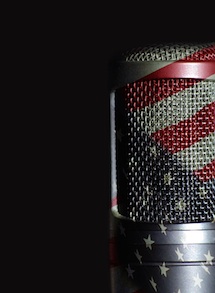By Krysta M. Larson
On Tuesday, September 27, Creighton University’s Heider College of Business and the Institute for Economic Inquiry (IEI) hosted a panel about the role of free speech on university campuses. The IEI holds similar events throughout the semester that bring conversations about markets to campus; this panel focused on the market of ideas. The panelists speaking on this topic were Antony Davies, PhD, associate professor of economics at Duquesne University; Stanley Fish, PhD, of the Benjamin N. Cardozo School of Law at Yeshiva University; Jonathan Rauch (ΦBK, Yale University, 1982), guest scholar at the Brookings Institution in governance studies; and Omar Wasow, PhD, internet analyst and assistant professor of politics of Princeton University.
Palma Joy Strand, JD (ΦBK, Stanford University, 1978), served as the moderator during the panel. She opened the discussion by providing context on the issue, citing the controversial announcement by the president of the University of Chicago that the institution does not support “trigger warnings” or “safe spaces.” She also provided a definition for safe spaces from Advocates for Youth, which describes them as a place where no one is made to feel uncomfortable, unwelcome, or unsafe and where the focus is on each individual’s self-respect and dignity. She then asked the panelists to comment on their stances on the topic.
Rauch began by expressing his belief that open intellectual spaces provide better outlets for minority groups to make their voices heard. To illustrate this point, he used a personal example regarding LGBT rights in America: As a homosexual man, he was harassed on the street because his community was regarded as perpetuating hate speech against traditional marriage. However, homophobic treatment toward his community brought to light issues of inequality and allowed changes to be made regarding the treatment of couples in homosexual relationships. Rauch argued that facing offensive and dissonant viewpoints allows minorities to stand against hateful speech and fight for equality.
Fish then stated his opinion that free speech is not an academic value. He explained that universities are not democratic institutions and thus are able to limit speech on campuses. They select which speakers are allowed to present, which books can be printed with university presses, and which faculty members get tenure—there is more exclusion of ideas on college campuses than inclusion. Free inquiry into a variety of topics is, however, an academic value, and leads to the search for truth and the advancement of knowledge.
Wasow’s perspective focused on the need for safe spaces on campuses. He explained that since college campuses are complex and diverse places, there should be different regulations regarding free speech for different contexts. There should be places on campus where anyone has the right to speak their opinions, but there should also be spaces where people can retreat. In a free society, people should have the opportunity to disengage from public debate as well as engage.
Finally, Davies connected the topic of free speech to the idea of a free market. In a capitalist society, entrepreneurs have the freedom to introduce both good and bad ideas to consumers. Consumers gravitate toward the good ideas, and the bad ones fail. In the same way, ideas on a college campus should have equal opportunities to be presented in public. Campus audiences will be attracted to good ideas and repelled by bad ones. When you restrict certain ideas on campuses, you are restricting opportunities for new knowledge.
The ensuing dialogue between the four panelists brought further insights into the topic. Some questions raised included whether universities have a right to silence particular speakers and what separates opinions from harassment. There was no general consensus among the panelists as to how the issues of free speech and safe spaces on college campuses should be handled; audience members experienced a variety of different opinions on the topic. These scholars’ diverse perspectives helped audience members consider new aspects of the issues at hand, and use these different views to evaluate their own ideas regarding the extent to which universities should control speech on campus or provide safe spaces for students.
Krysta M. Larson is a senior at Creighton University majoring in English and journalism. She is a recently inducted member of Phi Beta Kappa. Creighton is home to the Beta of Nebraska Chapter of Phi Beta Kappa.




